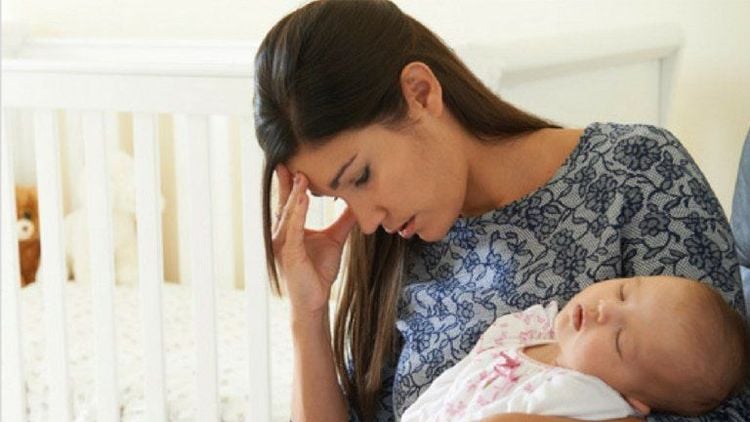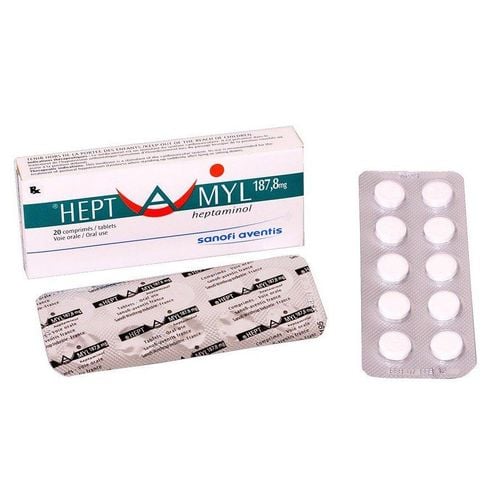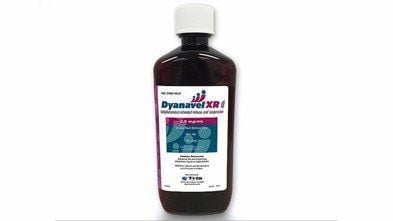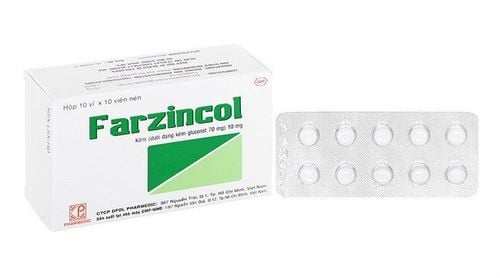This is an automatically translated article.
1. Why do women easily feel tired after giving birth?
Postpartum fatigue is quite common in postpartum women, this condition can last for many months. Your body is currently in the process of physically recovering from pregnancy and childbirth.
Staying up at night to take care of a newborn can happen often, making you feel exhausted, tired and the recovery process takes place slower.
Some common reasons why you feel tired after giving birth include:
Lack of sleep : When the family welcomes a new member, it is difficult for the mother to enjoy a full night's sleep, having to stay awake all the time. At night, getting up early, having trouble sleeping because of taking care of small children are also understandable reasons why postpartum women often get tired. Loss of strength, blood loss during childbirth: The mother can take up to hours, expending a lot of strength and energy to bring the baby out. This is the mother's most successful birth. The mother's fatigue becomes worse when the mother has lost a large amount of blood, the incision has not yet recovered, the side effects of painkillers, anesthetics... Breastfeeding: To maintain To maintain physical strength and produce milk for lactation, the mother needs more energy after giving birth. While the diet and rest are not adequate, the consumption of a large part of energy that makes the mother unable to recover will increase the feeling of fatigue and exhaustion. Fatigue pathology: To make up for the deficiency and fully recover after giving birth, the body needs a certain time. However, because of a certain medical condition that makes fatigue impossible to overcome, accompanied by other abnormal signs of health, then it is necessary to pay special attention to yourself.

In addition, postpartum fatigue is also a warning sign of a number of diseases, such as:
Postpartum depression: According to experts, women appear to feel extreme fatigue 1-2 weeks after giving birth. Newborn babies can progress to postpartum depression within 4 weeks of birth with typical manifestations such as exhaustion, loss of energy, sad mood, anxiety, restlessness, frequent restlessness, loss of interest almost everything, easy to cry, memory, concentration decreased... Postpartum depression: Fatigue in postpartum body weakness is different from simple fatigue, they often appear a in a constant, prolonged manner, even with rest, there is no improvement. Accompanied by other symptoms such as headache, dizziness, dizziness, body aches, trouble sleeping, forgetfulness, loss of concentration, irritability, mood swings, loss of interest in things .. .If this situation is not overcome soon, it will not only hurt your health but also mentally. Postpartum anemia: This is a disease that many women face during pregnancy and childbirth. In addition to unusual signs of fatigue, postpartum anemia may be accompanied by a number of other manifestations such as pale, pale skin, chest pain, shortness of breath, rapid heartbeat, headache, dizziness, brittle nails, skin Dry hair loss, poor resistance to infection... The cause of this condition may be iron deficiency during pregnancy, postpartum blood loss, poor nutrition... Low blood pressure Postpartum : Blood pressure readings can drop to less than 90/60 mmHg in women with postpartum low blood pressure, accompanied by feelings of fatigue, dizziness, lightheadedness, and frequent drops in blood pressure. , headache, blurred vision, trouble sleeping, cold limbs, forgetfulness, forgetfulness, loss of concentration... The above symptoms may appear as early as a few weeks or as late as a few months after birth, even some cases persist throughout pregnancy, childbirth and child rearing, depending on different conditions. Hypothyroidism: An underactive thyroid condition reduces the levels of thyroid hormones in the blood, making women feel tired after giving birth, and their metabolism and energy metabolism are affected. Besides fatigue symptoms, hypothyroidism can cause other symptoms such as: thinking, slow movement, fear of cold, weight gain, constipation, menstrual disorders, loss of appetite, poor digestion... About 5-7% of postpartum women have this condition and need early medical intervention.
Trắc nghiệm: Những điều cần biết về kiêng cữ sau sinh
Sau sinh, cơ thể sản phụ sẽ có rất nhiều sự thay đổi, việc thực hiện tốt các kiêng cữ sau sinh và bổ sung đầy đủ các chất dinh dưỡng cho cơ thể sẽ giúp ích rất nhiều trong quá trình hồi phục sức khỏe. Bài trắc nghiệm dưới đây sẽ giúp mọi người có cái nhìn tổng quan về kiêng cữ sau sinh và thực hiện sao cho phù hợp nhất.The following content is prepared under supervision of Thạc sĩ, Bác sĩ y khoa, Tạ Quốc Bản , Sản phụ khoa , Khoa Sản phụ khoa - Bệnh viện Đa khoa Quốc tế Vinmec Phú Quốc
2. How to deal with postpartum fatigue
Your priority right now is to save yourself energy. That may mean you need to give yourself time to rest and relax instead of tasks like cleaning the house.
Here are some ways to help you recharge yourself:
Take time to rest : Try to go to bed at night as soon as the baby is settled. Better yet, go to bed early and ask your partner to take care of the baby at night. You also need to take a nap and rest during your lunch break. If you're breastfeeding, lie on your side to care for your baby, which makes it possible to relax during feedings. Share chores with loved ones: To have more time to rest, you can share chores such as cooking, cleaning the house or taking care of the baby with your family members. Eat well: Pay attention to choosing healthy, energy-dense foods, like those high in complex carbohydrates and proteins. Do not use too much caffeine and sweets. Please maintain a scientific diet, diverse groups of substances, instead of abstaining from too many things or worrying about weight problems early, which is a common mistake of many mothers after giving birth. Need to increase nutritious foods such as beef, chicken breast, eggs, milk, sea fish, shrimp, crab, beans, cereals, papaya, pumpkin, dark green vegetables... Drink lots of water Postpartum women need to provide enough fluid for the body by drinking lots of water, eating liquid foods such as porridge, soup, soup... If possible, please consult your doctor about adding more types of food. vitamins, minerals. Continue taking your vitamins even after giving birth, especially if you are breastfeeding. Exercise: By taking your baby out for a walk, the child receives fresh air, and you relieve fatigue and stress. Being active can help you both sleep better at night. The first time you should do it with a short distance. As you regain your energy, you can gradually increase your speed.

Mental relaxation: Some movements such as yoga, meditation, reading, listening to music.... will help you feel more comfortable, against pressure and stress. Don't let postpartum fatigue linger and turn into postpartum depression. Therefore, please pay special attention to postpartum women to limit the risk of depression and unnecessary consequences.
Psychology Clinic - Vinmec International General Hospital officially came into operation in April 2019, has the function of examining, consulting and outpatient treatment of psychological problems and psychological health. With modern equipment, Vinmec Mental Health Clinic is currently cooperating with experienced professors and experts:
MSc. Doctor Nguyen Van Phi - Psychologist, Vinmec Times City International Hospital: with 7 years of experience working as a lecturer in Psychiatry - Hanoi Medical University, Doctor Psychiatrist at Hanoi Medical University Hospital & Central Geriatric Hospital, and a member of the Vietnam Psychiatric Association. MSc. Dr. Pham Thanh Luan - Psychologist, Vinmec Times City International Hospital: with 5 years of experience in research, examination and treatment of Psychiatric diseases, trained at prestigious universities trust, practice in-depth expertise in the French Republic. MSc. Doctor Nguyen Trong Hien - Psychologist, Vinmec Times City International Hospital: with 6 years as a lecturer in the Department of Psychiatry - Hanoi Medical University and Central Geriatric Hospital, together with Dr. Experience in research, examination and treatment of diseases in Psychiatry such as: emotional disorders, stress-related disorders and body dysmorphic disorders, developmental disorders in children, adolescents & childbirth .... Along with the implementation of psychological tests, intensive psychotherapy for diagnosis and treatment, in order to bring the best medical examination and treatment effect.
For detailed information, please contact the hospitals and clinics of Vinmec health system nationwide.
Please dial HOTLINE for more information or register for an appointment HERE. Download MyVinmec app to make appointments faster and to manage your bookings easily.
Reference source: babycenter.com
Recommended video:
What are the causes of postpartum depression?
SEE MORE
Overcoming dizziness after giving birth 5 causes of postpartum depression - early recognition for timely treatment Is postpartum depression curable?














